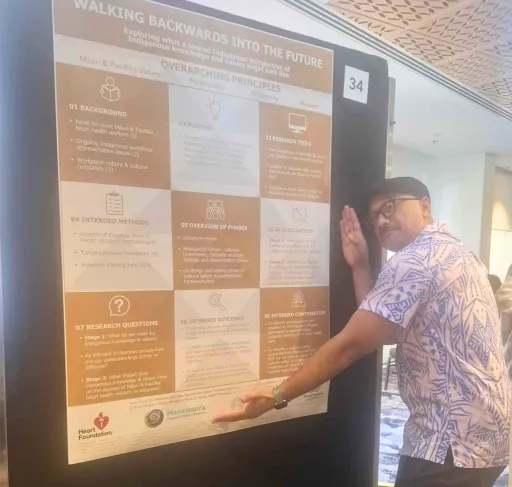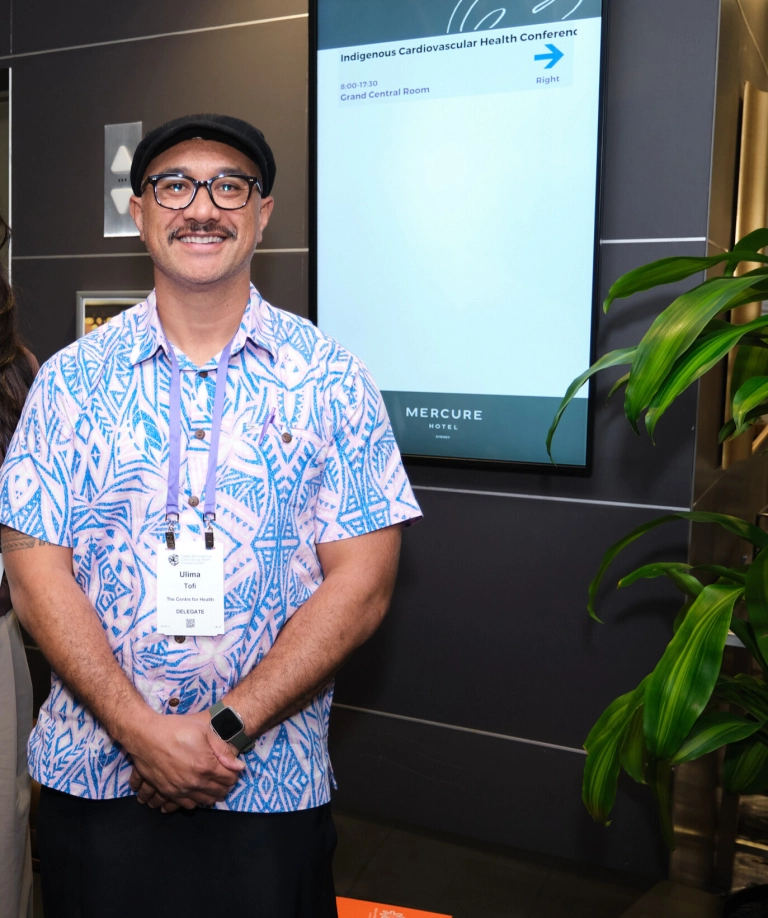Ulima Tofi: Championing Wellbeing for the Māori and Pacific Heart Health Workforce
For Vaea Ulima Tofi (Rongowhakaata, Ngāti Maniapoto, Tufulele, Vaipuna), pursuing research has sprung from his ultimate life purpose: serving his people. Supported by a Pūtahi Manawa Māori and Pacific Doctoral Scholarship, Ulima is on a mission to give Māori and Pacific heart health professionals a tool to assess an organisation’s safety and readiness to be a good employer. To do that, Ulima is uncovering what makes a good workplace for Māori and Pacific heart health workers, beyond a short commute and good parking.
From Physio to PhD: A Journey Rooted in Service
Ulima’s path into research wasn’t mapped out from the start. Vaea Ulima Tofi, who holds the matai title Vaea from Matāutu Apia in Samoa, originally trained as a physiotherapist. He found purpose in mentoring and supporting students, new graduates, and colleagues. As his career evolved, so too did his perspective. Working in hospitals and around clinicians, he noticed a pattern: Māori and Pacific workers often grappled with a sense of not quite belonging. Conversations revealed experiences of cultural marginalisation, professional isolation, and burnout — all of which deeply impacted their wellbeing and ability to serve their communities.
“I love people, and I want our people to be the best they can,” Ulima says. “But how can we expect our clinicians to care for others when they’re not being cared for themselves?”
This insight sparked his passion for research focused on the workforce experience of Māori and Pacific health professionals — their retention, wellbeing, and what makes a workplace safe and enjoyable.
Why This Research Matters
While the push to grow the Māori and Pacific health workforce has gained momentum, Ulima’s research explores what happens after these individuals enter the system. How long do they stay? What’s the quality of their experience? Are health organisations truly prepared to support and uplift Indigenous clinicians?
“We’ve got plenty of initiatives to recruit us, but nothing that captures what it’s like to be us in the workforce,” Ulima explains. “We don’t just need more people, we need better spaces.”
Ulima’s work delves into the lived realities of Māori and Pacific heart health workers — the good, the bad, and everything in between. He’s especially interested in developing tools that clinicians can use to critically evaluate whether an organisation is truly safe, inclusive, and culturally ready for them.
“Everyone wants us. But not everyone deserves us,” Ulima says. “We need to flip the script. Give our kaimahi (workforce) the power to ask: Is this place ready for me?”

A Global Relevance Grounded in Indigenous Knowledge
Ulima’s research has the potential to influence health systems locally, nationally, and globally. As the world increasingly turns to Indigenous knowledge systems, his work reinforces the importance of culturally grounded, values-based approaches, not just in patient care, but within the workforce itself. Flying to Australia this year, Ulima sparked conversations at the Cardiac Society of Australia and New Zealand Indigenous Cardiovascular Health Conference in Sydney.
“We talk a lot about cultural safety for patients,” he says, “but what about for us - the Māori, Pacific, and Indigenous staff?”
Fuelled by Faith, Family, and Legacy
Ulima’s drive to serve comes from deep roots. His parents, who returned to university later in life, modelled the power of education and service. His father, a Samoan migrant and factory worker, earned a psychology degree in his 40s. His mother, a teen parent, worked as a social worker, lecturer, and in management and education for over 40 years, also pursued higher education as an adult, all while raising a family.
“I never thought education was beyond me because my parents never let it be,” Ulima says. “They did the hard yards so I didn’t have to.”
Guided by faith, family, and the legacy of service on both his Māori and Samoan sides, Ulima sees his research as a career path and a calling.
Supported by a Kaupapa-Driven Network
Alongside his Pūtahi Manawa doctoral scholarship, Ulima is also a recipient of the New Zealand Heart Foundation Māori and Pacific Research Fellowship (three years). He acknowledges the support of key mentors and organisations — including Te Whare Tukutuku, Manawaora, and The Centre for Health — who have backed his journey and continue to walk alongside him.




